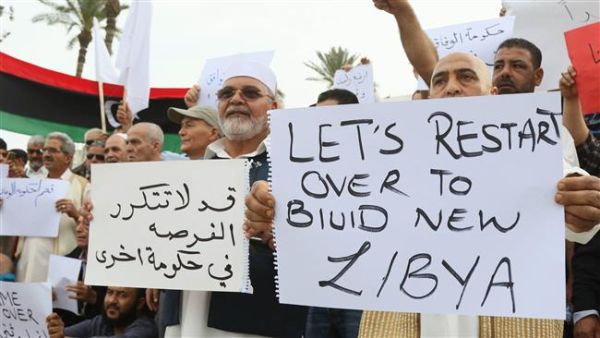Global and regional powers are prepared to supply arms to Libya's fragile unity government to help it fight Daesh extremists, foreign ministers announced after meeting Monday in Vienna.
"We will fully support these efforts while continuing to reinforce the UN arms embargo," the powers' chief diplomats said, acknowledging the unity government's request for exemptions to the embargo.
Top diplomats from 21 countries were meeting to discuss ways to strengthen Libya's UN-backed government and stabilize the country, which has become a hub for Daesh and other extremists, as well as for migrant smugglers.
"We are not talking about an international intervention. We are talking about assisting in training and equipment" for security forces, Libyan premier-designate Fayez Serraj told reporters.
The power vacuum created by Libya's two rival administrations since mid-2014, each backed by competing militias, and the chaos following the toppling of dictator Moamer Gaddafi in 2011 has enabled the Daesh militia to establish a foothold in the North African oil-rich country.
In March, a national unity government formed under a UN-sponsored peace deal revived international hopes that it will be able to re-establish stability and stop Daesh's expansion.
Based in Tripoli, it has limited influence elsewhere in the country, and it has yet to win a vote of confidence by the elected parliament based in Tobruk.
"The situation in Libya is really bad - I'll be frank - in terms of the economy, politics and security," Serraj said.
"The international community and the neighbours will not be spared this danger if terrorism were to grow outside Libya," he warned.
The foreign ministers of UN veto powers as well as North African, Arab, and European countries did not only pledge military support on Monday.
They also promised to step up humanitarian aid and to lend support to Libya's nascent state institutions including the oil ministry and central bank.
"It is the only way to generate the unity and cohesion that is required to defeat Daesh and other violent extremists that want to pull Libya back into violence and thuggery," US Secretary of State John Kerry said, using an alternative name for Islamic State.
Kerry said the international community would ensure that foreign weapons would not fall into the wrong hands.
"It is a delicate balance," he said.
"We are not discussing to eliminate the embargo," said Italian Foreign Minister Paolo Gentiloni, who hosted the talks with Kerry.
However, the embargo allows for exemptions, especially to secure the country and fight extremists, the two Western chief diplomats explained.
While Kerry said he respected Libya's request for arms and training rather than for a foreign intervention, he also warned that US President Barack Obama "will act whenever he deems it necessary to defend the United States' national security interests."
European countries are keen to see a stable Libya because they want to stop the lawlessness that has turned the country into a major hub for migrants seeking to go to Europe.
UN Libya envoy Martin Kobler estimates that at least 100,000 people could cross the Mediterranean from Libya to southern Europe this year.
"The question is: Will Libya remain a country at Europe's immediate southern border where terrorism, criminal people smuggling and instability expand?" German Foreign Minister Frank-Walter Steinmeier said.
By Albert Otti







![Turkish series "Ask-ı Memnu" [Forbidden Love]. Turkish series "Ask-ı Memnu" [Forbidden Love].](/sites/default/files/styles/d02_traditional/public/2026-02/%D8%A3%D8%A8%D8%B7%D8%A7%D9%84-%D9%85%D8%B3%D9%84%D8%B3%D9%84-%D8%A7%D9%84%D8%B9%D8%B4%D9%82-%D8%A7%D9%84%D9%85%D9%85%D9%86%D9%88%D8%B9.jpg?h=c673cd1c&itok=nhq8-5rH)


